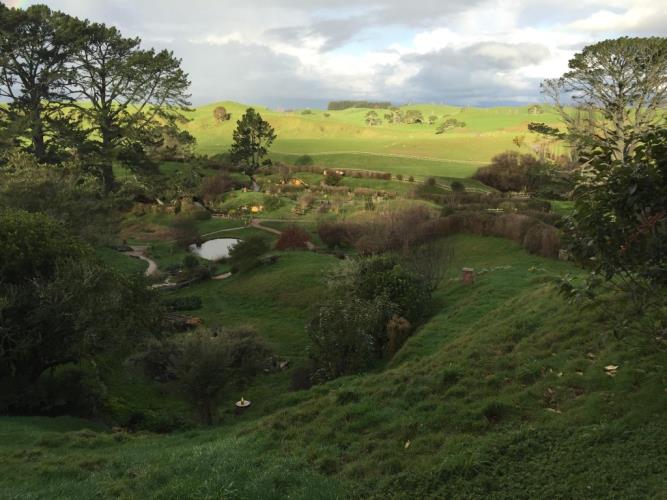Recipient of Macao Literary Prize and Macao Novel Prize, Joe Tang is a writer and cultural commentator, and has published novels, including The Floating City, Assassin, and The Lost Spirit. The latter two titles were translated into English and Portuguese. Joe’s portfolio also includes commentaries on art and plays. They include Words from Thoughts, Philosopher’s Stone, Journey to the West, Rock Lion, Magical Monkey and The Empress and the Legendary Heroes.

My family and I went to New Zealand to visit our relatives there during our summer hoilidays, and we also took this opportunity to travel around the country. I am sort of a fan of The Lord of the Rings and needless to say the legendary Hobbiton is on my travel list. For those who have read the novel or seen the films, you’ll know that Hobbiton is home to the Hobbits in the Middle-Earth in The Lord of the Rings written by English author J. R. R. Tolkien. It’s a fictional village but New Zealand filmmaker Peter Jackson had spotted perfect locations in his home country for Hobbiton. After The Lord of the Rings trilogy was screened, its book and film fans immediately flocked to the village for a visit, successfully turning Hobbiton to a world-famous attraction. It has also brought enormous tourist revenues.
Located on the outskirts of Matamata in the North Island in New Zealand, Hobbiton is a small town with only 13,000 residents. It has become a well-known attraction because of its stunning scenery shown in The Lord of the Rings series. I have had a lot of thoughts after visiting there for several hours. First, what impressed me the most is that a right balance is struck between tourism development in Hobbiton and keeping the serenity of the area. Visitors to Hobbiton can board shuttle buses that leave from the visitor centre in Matamata, or drive to the entrance of Hobbiton and then board a bus with a guide who will escort you through Hobbiton. The whole tour lasts two hours and the final spot is the Green Dragon Inn, where you can take a rest and enjoy a complimentary Hobbiton brewed beer. The atmosphere is relaxing.
However, when it comes to developing an industry, if one thinks that one should ride on the wave of success, profit maximisation is the next step. If that is the case, the Hobbiton-themed tourism project undoubtedly has enormous potential to be developed. For instances, a Hobbit theme park can be built, a Middle-Earth-themed cosplay parade, a Lord of the Rings-themed boutique hotel and restaurant, or even “Hobbiton Service Apartments” and “No. 1 Middle-Earth Vilas” can be added. Don’t forget that Hobbiton boasts a total of five million sqm of farmland! However, New Zealanders do not do so. Instead, they have kept a balance between recreation and money making. As I recall, the atmosphere there was relaxing and the number of visitors was just about right. Together with the picturesque scenery, we really felt that we had arrived in the Middle-Earth. Now, take a look of Macao. With people flooding the Avenida de Almeida Ribeiro and the St Paul’s Ruins where always need crowd control, it’s difficult not to feel disappointed.
Hobbiton in New Zealand also gives me some other food for thought. In this highly globalised world, we should think wider when it comes to the development and operation of the cultural and creative industries. Take Hobbiton as an example. Originally written by English author J. R. R. Tolkien, the stories were adapted for screen by a film company in the United States (with investors from other countries). The New Zealand filmmaker spotted a small town in his country and turned it to Hobbiton in the Middle-Earth. This not only enriches New Zealand’s tourism resources, but also boosts local economies. For example, our six-person family spent a total of HK$2,000 for the entrance fees. Apart from that we also bought food in a bistro and gifts from a souvenir shop. Other spending in the small town includes fuel charges, shopping and meals. All together we had spent a considerable amount of money in this trip.
“Cultural Industries” is a catchphrase nowadays but actually it’s not difficult to understand what it is. Honestly it’s all about the ability to tell good stories. To do this it’s essential to have both talents and connectivity – that is to be clear on the positioning and allow one to put his or her talents to good use when stepping into this globalised industry with endless opportunities. Therefore, we in Macao, instead of making quick money, should really look to the bigger picture — that is to do what we are good at to the best; refuse to be opportunistic; and be sensible. With these qualities, I am confident that this small city can also contribute a lot to the industry.